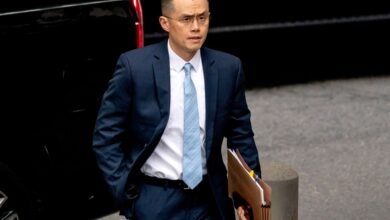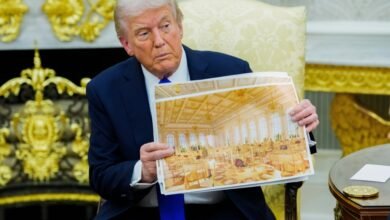Trump Family’s Potential Gains from CZ Pardon Revealed

▼ Summary
– President Trump’s controversial pardons of George Santos and Changpeng Zhao were overshadowed by the destruction of the White House’s East Wing, which drew public attention away from the pardons.
– Tech companies like Meta, Apple, and Amazon are funding Trump’s National State Ballroom Fund to gain regulatory leniency, as the administration operates on caprice rather than long-term policy.
– Crypto firms such as Ripple and Coinbase are also donors, seeking to shape new regulations in their favor as the industry faces increased government scrutiny for the first time.
– Changpeng Zhao’s pardon may remove legal restrictions from his felony conviction, potentially allowing him to resume leadership at Binance and engage more freely in financial activities.
– The relationship between the Trump family and crypto leaders like Zhao is mutually beneficial, providing credibility and influence for the Trumps while offering regulatory advantages to crypto figures.
The recent presidential pardon granted to Changpeng “CZ” Zhao, the billionaire founder of cryptocurrency exchange Binance, raises significant questions about the intersection of political power, financial influence, and regulatory oversight. While public attention focused on the dramatic physical destruction of the White House’s East Wing, the administration’s controversial clemency decisions reveal a deeper pattern of transactional relationships between technology leaders and government officials.
These seemingly unrelated events actually demonstrate a consistent dynamic within the current administration: tech industry funding enables political maneuvers that reshape American institutions, while corporate interests secure favorable treatment in return. Major technology firms including Meta, Apple, Amazon, Alphabet, Microsoft, and telecommunications companies have contributed substantially to political funds, positioning themselves to influence policy decisions that affect their operations.
Cryptocurrency entities show particularly strong representation among political donors, with Ripple, Coinbase, Tether, and prominent individuals like the Winklevoss twins and Paxos cofounder Charles Cascarilla all participating. Unlike established tech giants seeking to avoid regulatory penalties, crypto organizations face emerging government scrutiny and see an opportunity to shape the regulatory framework that will govern their industry.
Zhao’s situation presents a compelling case study in this dynamic. After pleading guilty to financial sanctions violations and money laundering charges during the previous administration, he received what many considered a lenient sentence: four months imprisonment and a $50 million fine. His cooperation with investigators reportedly provided valuable information to authorities, contributing to the relatively mild punishment.
Despite having completed his sentence and maintaining control over Binance, Zhao pursued a presidential pardon through lobbyists with connections to the Trump family. This effort appears puzzling until considering the practical limitations facing convicted felons. Financial regulations restrict felons from holding certain positions, particularly in finance-related industries. Zhao had been required to step down as Binance CEO and accept a three-year prohibition from conducting business with the company he founded.
The pardon potentially removes these professional restrictions, allowing Zhao to resume leadership roles and engage more freely with the global financial system. This becomes particularly significant as cryptocurrency seeks greater integration with traditional banking institutions. Since American financial regulations affect any transaction involving U.S. dollars, clearing Zhao’s record facilitates his ability to operate within the mainstream financial ecosystem.
The relationship between the Trump family and major cryptocurrency figures extends beyond Zhao. The administration has shown favorable treatment toward several prominent crypto investors, including Justin Sun, who maintains connections with Eric Trump. These relationships create mutual benefits: political figures gain credibility within the crypto community while industry leaders secure regulatory advantages.
Binance’s partnership with Trump-associated crypto ventures gives the exchange substantial influence over these operations. As one of the largest cryptocurrency platforms globally, Binance provides technical administration for Trump-related crypto projects, creating interdependence between the political family and the exchange founder.
The broader question concerns how we define improper influence in political contexts. When wealthy individuals and corporations can effectively purchase favorable legislation through legal channels, the distinction between legitimate lobbying and undue influence becomes blurred. The current administration appears to be testing the boundaries of acceptable political conduct, raising fundamental questions about equality of access to political power.
As cryptocurrency continues its push toward mainstream acceptance, figures like Zhao require clean legal records to operate within traditional financial systems. The presidential pardon serves as a key that unlocks doors otherwise closed to convicted felons, regardless of their wealth or industry standing. This case illustrates how political connections can reshape professional trajectories in ways unavailable to ordinary citizens, highlighting ongoing tensions between money, power, and justice in contemporary governance.
(Source: The Verge)



